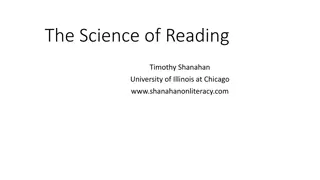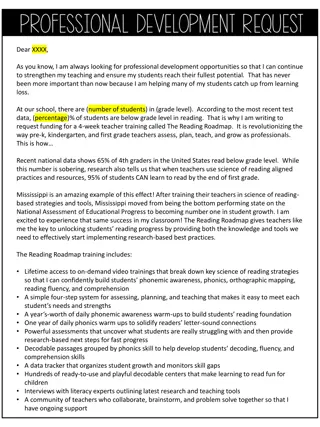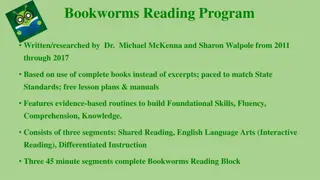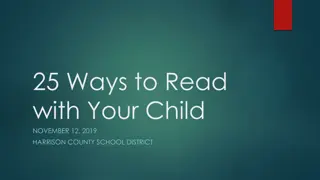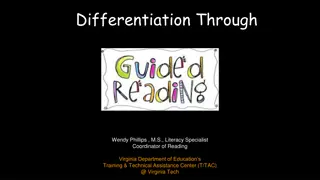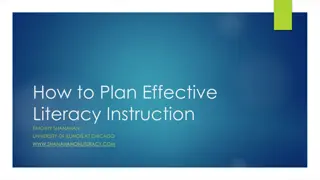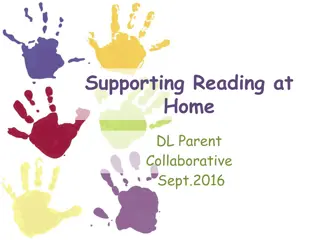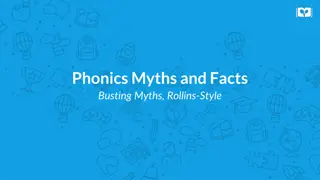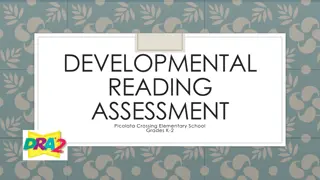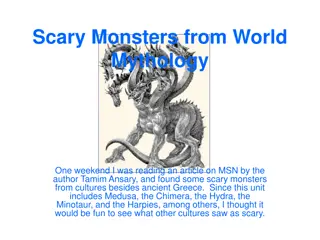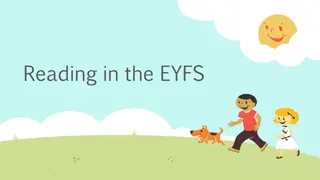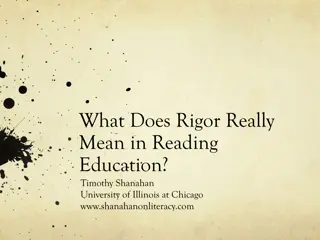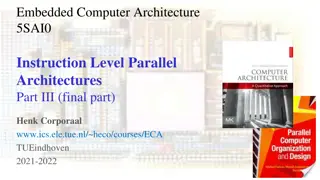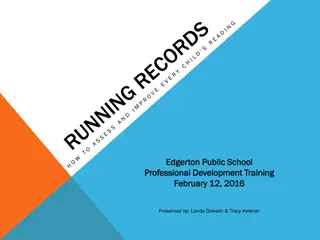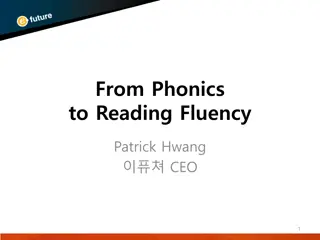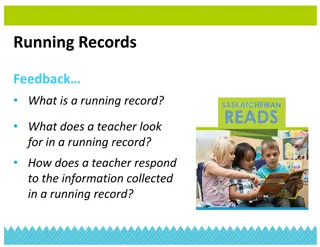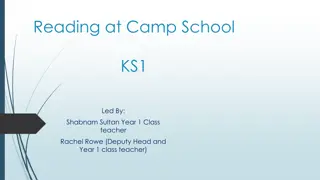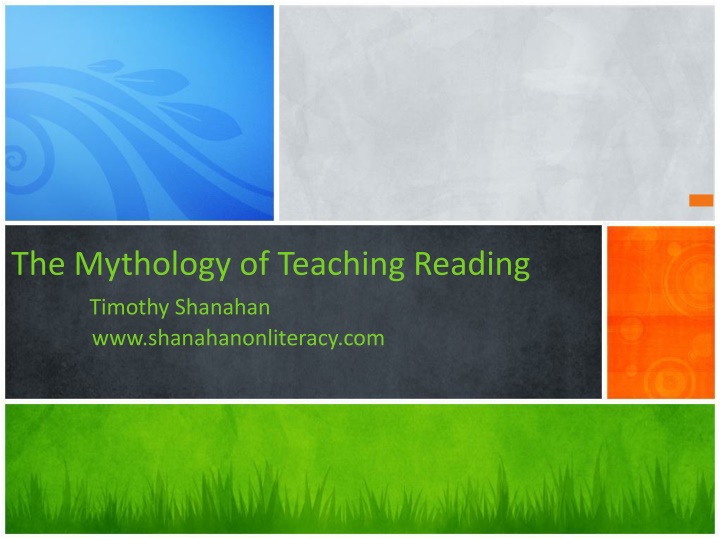
Teaching Reading: Challenging Educational Myths and Practices
Explore the myths surrounding teaching reading and the sources of our educational practices. Discover how tradition, published programs, authority, fads, inspiration, and research shape our teaching methods. Delve into the impact of mythology in the field and debunk the myth that reading must be taught in the morning.
Uploaded on | 5 Views
Download Presentation

Please find below an Image/Link to download the presentation.
The content on the website is provided AS IS for your information and personal use only. It may not be sold, licensed, or shared on other websites without obtaining consent from the author. If you encounter any issues during the download, it is possible that the publisher has removed the file from their server.
You are allowed to download the files provided on this website for personal or commercial use, subject to the condition that they are used lawfully. All files are the property of their respective owners.
The content on the website is provided AS IS for your information and personal use only. It may not be sold, licensed, or shared on other websites without obtaining consent from the author.
E N D
Presentation Transcript
The Mythology of Teaching Reading Timothy Shanahan www.shanahanonliteracy.com
Mythology In a field with so many sources of action, mythology is sure to take hold Myths are usually not entirely wrong, but often contain some grain of truth that make them believable even to smart professionals Can be valuable to occasionally take a critical look at those things that you believe Are they true? Are they false? Does it matter?
Reading must be taught in the morning Myth 1
Reading must be taught in the morning I do reading in the morning and math in the afternoon. Until this year, my school was a "Reading First" school so, obviously, we had to do reading...first. We are no longer a Reading First school but, still operate that way I prefer teaching reading in the morning and math in the afternoon. In fact, almost all of my Lang. Arts is before lunch. I'm fortunate l to have a BIG block in the morning for it. We have a mandatory literacy block for 2.5 hours every morning. After that (which almost takes us to lunch) we are free to arrange our schedules anyway we like. At first, this felt a little confined, but after doing it for 2 years I wouldn't have it any other way. Our reading scores are improving and we couldn't be prouder at our school. Myth 1 I have done both, though I prefer teaching reading first thing in the morning. I feel like it starts our day off with a great start!
Reading must be taught in the morning Is it true? Myth 1
Reading must be taught in the morning No No consistent reliable findings supporting this idea Some studies do show the morning to be best, but equal numbers of of counter studies Morning effect affected by student ability, age, biorhythms, availability of break times, handedness and many other factors (Banerjee, 2008; Carbo, 1984; Davis, 1987; Klein, 2004; Natale & Lorenzetto, 1997; Ozturk, 2014) Teachers? Myth 1
Reading must be taught in the morning Does it matter? Myth 1
Reading must be taught in the morning Yes and no Coaches/principals often try to observe, demonstrate, etc. during reading instruction, makes that hard to do Even bigger problem with pull-out reading interventions School day schedules may be more efficient or powerful if teachers can plan literacy work throughout the day (reading blocks?) Myth 1
Learning to read is a natural process The acquisition of literacy is merely an extension of natural language for children. Children are in no more need of being taught to read than they are of being taught to listen. Children learn oral language without having it broken into little bits Keep language whole and involve children in using it functionally and purposefully to meet their own needs. Myth 2
Learning to read is a natural process Is it true? Myth 2
Learning to read is a natural process No Learning to read requires specific instruction for most children Even children who seemingly learn naturally prior to entering school are being taught to read by parents, etc. (Tobin, 1982) Oral language and literacy learning are related to each other, but they are not learned in the same way Oral language requires more teaching than is often appreciated Myth 2
Learning to read is a natural process Does it matter? Myth 2
Learning to read is a natural process Yes This does matter because the myth leads to lots of false claims about reading instruction (e.g., create a literacy-rich environment and kids will learn to read, don t teach phonics) Studies show that decoding instruction is beneficial to children (NRP, 2000; NELP, 2008) This is beneficial to all kids, but especially important to struggling readers (poverty or disability) (Stahl & Miller, 1989) Myth 2
Good teachers dont use textbooks I think schools should stop using textbooks. They constantly change and schools don't always have all the money in the world to keep updating them, and don't get me started on all the paper we're wasting. Currently in my district at the elementary level, we are in the process of strategically moving away from our basal reading program. We ve already cut out its writing component Also, we ve begun the process of designing our own reading comprehension instruction. The structure of basal programs does not lead students to reading independence because the lessons focus on unchanging routines and not growing expertise. Myth 3
Good teachers dont use textbooks But is it true? Myth 3
Good teachers dont use textbooks Yes and No Many variables distinguish good teachers: teacher knowledge (Foorman & Moats, 2004); ability to provide clear explanations (Duffy, 2002), to set/clarify purposes (Porter & Brophy, 1988), to engage students in productive instructional conversations (Sanders, Goldenberg, & Haman, 1992), etc. Textbook use is not one of these And, no reason to believe that textbook use would affect or interfere with any of these (Barr & Dreeben, 1983; Martin, Valdman, & Anderson, 1980; Rowan & Correnti, 2009; Taylor, et al., 2003) What Works Clearinghouse Myth 3
Good teachers dont use textbooks Does it matter? Myth 3
Good teachers dont use textbooks Yes It s the wrong benchmark for any of us to strive for Teachers can be led to spend way too much time trying to create curriculum, when their time could better be used to focus on student needs and adjustment Can encourage districts to less systematic approaches (NICHD, 2000) Issues of equality and fairness How do you improve on scale without commonality? Myth 3
Small group teaching is better than whole class Myth 4
Small group teaching is better than whole class Why are small groups more effective when children learn to read? Find out why, and how to implement best strategies for teaching beginning readers in this practical article that is based on current research. Small Group Instruction: Teacher Best Practices Small group instruction allows teachers to place students in just right books, to increase the amount of student interaction and responsiveness, to facilitate instruction targeted on student needs, and to observe students more carefully Myth 4
Small group teaching is better than whole class But is it true? Myth 4
Small group teaching is better than whole class Yes and No Research supports the idea that small groups generally learn more than whole classes (National Early Literacy Panel, 2008; NICHD, 2000; Slavin, 1989; Slavin, 1993; Slavin, Lake, Chambers, Cheung, & Davis, 2010) Consequently, teachers are encouraged to teach in small groups However, that isn t the pertinent comparison Students do make bigger learning gains when working closely with teacher in small group, but advantage dissipates when they work independently (Sorenson & Hallinan, 1986; Taylor, Pearson, Clark, & Walpole, 2002) Myth 4
Small group teaching is better than whole class Does it matter? Myth 4
Small group teaching is better than whole class Yes There are immediate benefits to small group instruction, but that is not the most efficient way to teach Not enough attention to good independent work Not enough attention to how to deliver effective whole class teaching Myth 4
Speed of reading is the hallmark of fluency Myth 5
Speed of reading is the hallmark of fluency Fluency refers to the accuracy, speed, and expression of oral reading Hurried reading is rewarded, reading the text at normal speed is not by DIBELS and similar tests Read as fast you can Myth 5
Speed of reading is the hallmark of fluency But is it true? Myth 5
Speed of reading is the hallmark of fluency Yes and No Reading rate does matter Young children tend to accomplish reading accuracy, but at the cost of speed (Morris, 1998) They have to learn to decode quickly enough that they can read without paying conscious attention to the decoding However, the issue is not speed, but proficiency If one reads too quickly, then comprehension will be lost (Stahl & Kuhn, 2002) Speed is important, but it is the speed of language, not speed itself that matters Myth 5
Speed of reading is the hallmark of fluency But does it matter? Myth 5
Speed of reading is the hallmark of fluency Yes If one has students taking tests like DIBELS while trying to read as quickly as possible, rather than reading with the idea that you will be questioned, then the test will misinform instruction If the teaching emphasizes speed over accuracy or expression (prosody) than the student will not make appropriate learning progress Speed is not the hallmark of fluency, but just one aspect of its measurement Myth 5
Independent reading time during the school day is essential to learning Myth 6
Independent reading time during the school day is essential to learning Ironically, when teachers are pressed for time, independent reading is usually the first thing to be cut. Yet a carefully monitored independent reading program is the single most important part of your reading instructional program. How do you get to Carnegie Hall? Practice, practice, practice! How do you get to be a proficient (even prolific) reader? Practice, practice, practice! We know children learn to read by reading. Is independent reading valuable enough to use precious classroom minutes on? Myth 6
Independent reading time during the school day is essential to learning Is it true? Myth 6
Independent reading time during the school day is essential to learning Yes and No National Reading Panel concluded that there was not sufficient research on this draw conclusions (NICHD, 2000) However, the case was dubious (it was not clear that free reading time was increasing student reading and studies that found reading on one s own without guidance was better than doing random worksheets) Studies since then that set out to demonstrate that NRP was wrong have not had an easy time inconsistent, small impacts (e.g., Kamil, 2008; Kim et al., 2016; White et al., 2014; Kim & Quinn, 2013) Myth 6
Independent reading time during the school day is essential to learning Does it matter? Myth 6
Independent reading time during the school day is essential to learning Instructional time is limited and amount of teaching is related to learning reducing instructional time is risky to students Comparison of the effect size of free reading with the effect size of the average instructional intervention suggests that teaching has a 800% advantage of over free reading Myth 6
Sight vocabulary is a memorization skill Myth 7
Sight vocabulary is a memorization skill Now we do more repetition on the word, adding spelling to make a deeper cognitive impression. The arm-tapping motions stimulate the kinesthetic sense and provide tactile feedback. Sight word acquisition is an important building block in the construction of a child s ability to read. Once she is able to read all of the words on Dolch Lists for example, she has access to up to 75% of what is printed in almost any piece of children s literature. How exactly do teachers and parents help children develop their stores of sight words? Myth 7
Sight vocabulary is a memorization skill Is it true? Myth 7
Sight vocabulary is a memorization skill Yes and No Initially, memorization is the only tool that children have However, sight word learning is highly dependent on students knowledge of decoding (Ehri, 2004; Share, 1995, 1999; Stuart & Coltheart, 1988) As they learn letters and letter sounds and their relationship, sight word learning becomes quick and efficient Even high frequency words that may evidence irregular sound-symbol patterns are dependent upon this knowledge (the regular parts of the words) Myth 7
Sight vocabulary is a memorization skill Does it matter? Myth 7


